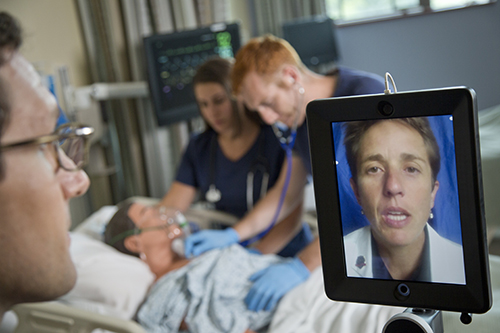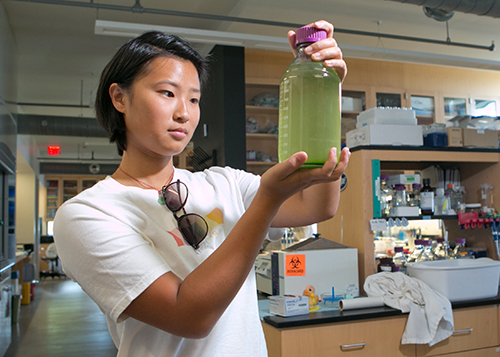When I was named to the new position of Vice President for Research at Duke last month, it was the culmination of an extensive process that examined how Duke performs all aspects of research. But rather than being seen as an end-point, I hope that everyone will view this as a beginning.

This re-examination of Duke’s research was led by President Price and included many leaders from across Duke, including Provost Sally Kornbluth, Chancellor Eugene Washington, and the Dean of the School of Medicine, Mary Klotman. We also engaged the services of an External Advisory Panel that included Ann M. Arvin (chair), professor of pediatrics and microbiology and former vice provost and dean of research at Stanford University; Edward M. Stolper, William E. Leonhard Professor of Geology and former provost at Caltech; and Barry S. Coller, David Rockefeller Professor, physician-in-chief and vice president for medical affairs at Rockefeller University.

During the Advisory Panel’s visit to Duke, Dr. Coller made a comment that stuck with me. He said: “You can always tell the effectiveness of an organization by how anyone within it responds when they answer the phone and hear this request: `Please connect me to the quality department.’ ” At a high-functioning organization, Dr. Coller said, anyone answering that query would say that they are responsible for quality, as is everyone in our organization.
There is no separate department of quality; everyone is a member of the quality department. This, I think, is something that all of us working and studying at Duke should take to heart, concerning everything we do at Duke, including all aspects of research. We need to not only be in charge of quality within our own research, but also take the responsibility to each other and to the institution, to assure that everything throughout the Duke research enterprise is done with the highest quality. That means excellence in all its forms, including ethics and integrity.

My hope is that the Duke research enterprise will be characterized as a highly functioning operation. Toward that end, if you should see something that can be improved, seek to improve it. Often this can be done directly, by utilizing the agency we may have in a given situation. If the issue requires broader engagement, communicate with your School leadership, or with the Duke Office of Scientific Integrity (DOSI). Let’s work as a team.
Duke’s move to a Vice President for Research position, with oversight over all aspects of our research in both the School of Medicine and the schools and departments on the campus side, is a reflection of what many in the administration have been calling a “One Duke” philosophy.
WE NEED TO … TAKE THE RESPONSIBILITY TO EACH OTHER AND TO THE INSTITUTION, TO ASSURE THAT EVERYTHING THROUGHOUT THE DUKE RESEARCH ENTERPRISE IS DONE WITH THE HIGHEST QUALITY.
Lawrence Carin
We are increasingly one university, with the lines between different schools blurring, and when it comes to research, that is one of our great competitive advantages over peer institutions.
I hope we also can go beyond “One Duke” and emphasize “Our Duke.” While every member of the Duke research community must be a member of the Duke Research Quality Department, this is particularly true of our faculty. Faculty should not just feel that they are employees of Duke; as faculty, each of us has a leadership responsibility for stewardship of Duke as a whole.

Given the pressure faculty face to find and secure research funding and to publish high-quality research, it is natural that faculty tend to focus on their own relatively narrow part of Duke– their lab and students. While this is to be expected for junior faculty, we must expect something more from our senior faculty.
Senior Duke faculty have a responsibility to foster an environment dedicated to the highest quality of ethics and integrity, if for no other reason than that the actions of a tiny minority can impact the reputation of the entire university, as we’ve seen in a few isolated but high-profile examples that affected all of us individually, and our institution’s reputation nationally.
By Our Duke, I mean a culture that emphasizes that the research enterprise at Duke belongs to all of us, and all of us have a responsibility to care for it.

To help me with the expanded duties and responsibilities of being Vice President for Research, we have identified four faculty who will be engaged on research challenges, helping me and my OVPR colleagues with direction and implementation.
Susan Alberts (Biology & Evolutionary Anthropology), Sonke Johnsen (Biology), Hashim Al-Hashimi (Biochemistry) and Andrew Muir (Division of Gastroenterology in Department of Medicine) have agreed to become regular members of the VPR team, meeting with me and other Duke leaders regularly.
We intend to pull in a larger group of Duke faculty to supplement and help us. Our goal is not to make every faculty member an administrator. Our goal is to have increasing faculty ownership of Duke’s overall research enterprise, providing inputs and guidance, and helping us set priorities.
To say everyone is a member of the Quality Department is easy; to make it happen is another thing. We will be engaging faculty extensively in this process. It is critical that we do this together, as a community dedicated to achieving the highest quality in everything we do at Duke.
I look forward to working with all of you to pursue this new vision of an integrated, caring, high-quality Duke research community.


